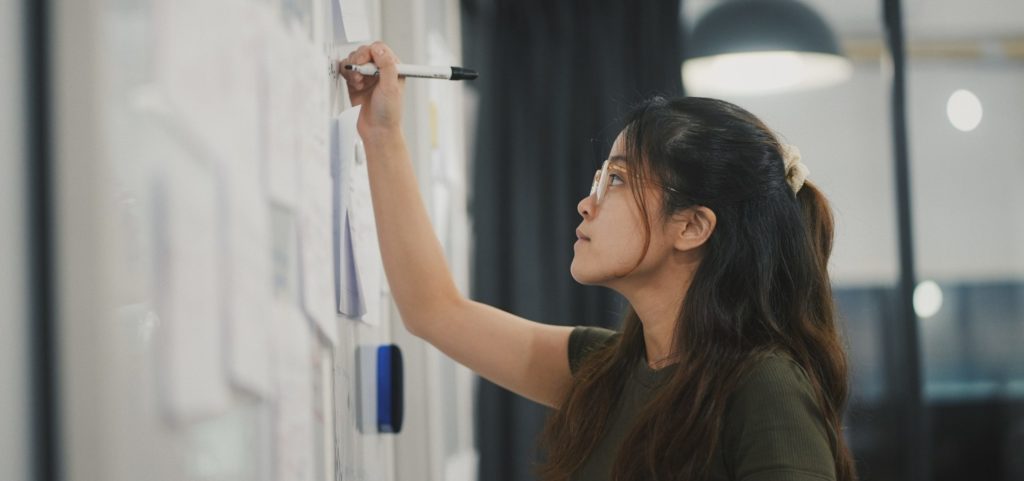In today’s digitally-driven world, educators are discovering new ways to deliver experiential learning experiences such as project-based learning.
Through online tools such as video conferencing software, messaging apps, and simulated work environments, educators can still help students become industry-ready through a project-based learning platform and educational experiences.
Find out more about the power of an online project based learning platform and how it can help your students succeed in the working world in this article.
What is project-based learning?
Project-based learning (PBL or PJBL) is an educational pedagogy in which students apply knowledge and skills to various real-world applications.
The goal behind PBL is to teach students how to solve problems and make decisions relevant to their daily lives, rather than simply memorising facts. It emphasises the process of learning (such as research, analysis, and reflection) over the final result.
In a project based learning environment, lesson plans consist of teachers being the facilitators who guide students through identifying a topic, planning a solution, exercising research, and analysing the results. As educators, we can encourage students to take risks and take creative approaches to find solutions, helping them build essential skills for success in the working world.
Different types of project-based learning
Educators can deliver project-based learning in a variety of ways. The idea is to keep students engaged with a relevant driving question and in-depth research and reflection.
Some popular approaches to project-based learning include:
- Action Research: Students take on the role of researcher and conduct an action research study related to a real-life problem in their community.
- Case Study: Students work on a simulated case study or live case assigned by an organisation or company.
- Community Action Project: Students identify a problem in their community and work with local organisations to create solutions.
- Course Project: A student creates a course-related project, often with other students, designed to teach them about a timely topic.
Let’s say a student is strong in science and mathematics, with a keen interest in robotics and future technologies. As educators, we can draw upon these strengths and deliver highly-applicable learning experiences to benefit students and encourage their growth.
For example, the student could identify a problem in their community—like potholes or graffiti—and design a robot to solve that problem. There would be no need to build the robot, since the learning stems from the ability to actively identify, research, and reflect upon an issue, which students can achieve through digital tools.
Why is Project-Based Online Learning important for students?
Project-based learning platforms offer many benefits for students, from helping them succeed in work and life to building their self-confidence. Educators will also see many benefits, from better classroom attentiveness to higher attendance and retention rates.
Let’s start by talking about the key differences between experiential education (i.e. project-based and work-integrated learning) and traditional educational approaches.
In a traditional educational environment, educators deliver information to students. This delivery normally comes in lectures, tutorials, or worksheets, where students must absorb and retain verbal or visual instruction.
While this approach is effective for some students, it doesn’t consider the broad range of individual learning styles, skills, and interests. These styles, as outlined by experiential learning theorist David Kolb, are:
- Diverging (feeling and watching)
- Assimilating (thinking and watching)
- Converging (thinking and doing)
- Accommodating (feeling and doing)
The assimilating learning style is best suited to traditional education, since these students learn well through readings, lectures, and reflection. However, this leaves out three other styles encompassing millions of students around the globe.
That’s where project-based learning comes in. With project based learning platforms and work-integrated learning, students choose educational experiences related to their unique learning styles and interests. For example, a student with a diverging learning style—which focuses on idea generation and working with others—would benefit immensely from a community project like raising money for a local charity.
This focus on self-directed, tailored learning boosts retention rates, improves student engagement, and higher university employability rankings.
How does project-based learning online ensure students are industry-ready?
PBL platforms are a fantastic way to build hard and soft skills such as critical thinking to prepare your students for future employment. As an educator, you can deliver PBL experiences directly related to each student’s own learning and desired career path, even without them needing to step into a physical workplace.
Exposure to a collaborative environment
Teamwork is a vital skill across industries. PBL introduces students to the benefits and challenges of collaborative learning when engaging in tasks such as project management, teaching them to work better in a team and embrace different perspectives. For example, students could form a group and assign rules to each member based on their skills and interests, helping them learn more about their roles within a team.
Solving real-world problems
Many students can more deeply understand a subject by applying their knowledge to real-life situations and enhance their problem-solving skills. This application doesn’t have to happen in physical space—but their approach does need to solve a real-world problem.
For example, a student could identify a budding issue in their community—such as a lack of recreation—and use their problem-solving skills to research and design a solution, like a new park or sporting arena.
Developing critical thinking skills
Critical thinking considers all available information, both favourable and unfavourable, to make an informed judgment about the topic at hand. People who think critically will look at the information supporting their beliefs and identify evidence that might contradict their beliefs or point out errors in their reasoning.
PBL will help your students become more critical, agile thinkers thanks to the varied perspectives they’ll need to research and reflect upon. A driving point behind PBL is to offer varied student learning experiences, providing a perfect foundation for building critical thinking skills and further professional development.
Cross-cultural experiences
When educational institutions restrict students to a single learning environment, their perspectives and understanding of the world around them become restrained. Students must have a broad worldview to succeed in the workplace.
Students are encouraged to explore new ideas and work with people they may not meet in a traditional classroom environment through project-based learning. In the online space, these experiences could include Zoom meetings with industry spearheads from varied cultural backgrounds.
Building communication skills
Project-based learning is a fantastic way to help students build written, verbal, and non-verbal communication skills. PBL’s emphasis on teamwork is particularly important here, helping students explore different communication styles and interact with a range of unique personalities.
Communication remains vital for distance learning. Through virtual meetings, connecting via messaging apps, forums, and online instruction, students will learn how to interact in the online world—an essential skill for professional development within the growing remote workplace.
Accessing feedback and reflection
Feedback and reflection are some of the most important aspects of learning, engaging students and helping them identify and understand areas for improvement. Recognising mistakes is one of the most powerful ways to learn.
In the same way, reflection and feedback are integral parts of the working world, and students will need to learn how to accept and use feedback to succeed and engage in deeper learning. An applicant who can readily (and positively) receive feedback will stand out to all employers, regardless of their industry—reflecting well on your ability as a teacher and leader.
How universities can implement online project-based learning
While PBL learning is often described as ‘hands-on’, learning can continue outside of a physical environment. Your students will benefit immensely if the PBL projects involve dynamic, meaningful, flexible learning and sustained inquiry.
Some online project-based learning examples include:
- Students set health and wellness goals for themselves, creating and following plans to achieve them and recording their progress. Students then reflect upon their experience on their health journey and identify potential improvements.
- Students devise a business idea related to their unique interests and skills and create a business plan. Students use online collaboration tools to bring their project ideas to life.
One surefire way to deliver effective online PBL experiences to your students is through a dedicated platform like Practera.
Practera’s online project-based learning platform
Practera’s digital experiential learning platform makes delivering virtual PBL experiences, such as internships and action projects, easier than ever.
Via the platform and our managed services, educators can connect students with industry leaders, helping them access invaluable guidance and advice within the digital landscape. Thanks to the platform’s engaging user interface, integrated support tools, and AI-powered analytics, delivery is seamless, robust, and more efficient than ever—leaving you more time to focus on your students, lesson plans, and helping them achieve their goals throughout their learning process. Alongside this interface and improved computer literacy, connecting with our team can also ensure your projects are best suited to the needs of your students and program. We will focus on the project management of your programs and can ensure continuous support throughout the program with a dedicated program manager by your side. Our platform also offers you the ability to track student progress and intervene when necessary.
To begin, choose a proven online PBL experience from Practera’s in-built template library featuring over 100 projects focusing on real-world problems—or craft a unique experience using our flexible authoring tools. However you choose to engage your students, they’ll benefit from Practera’s 360-degree feedback, adaptive learning pathways, and chat-based collaboration tools.
To learn more about how our team and Practera’s platform can help you deliver powerful project-based learning online experiences for your students, download our whitepaper or start a conversation with our team today.
30-day free trial
Receive an exclusive 1:1 onboarding for your 30-day free trial with one of our experts and learn how to author, manage and launch amazing experiential learning programs with one easy-to-use platform.
No commitment or credit card needed to get started with your trial.





